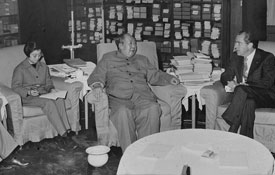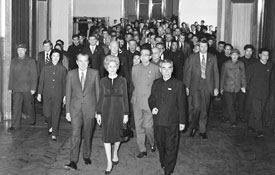|
 |
 |
|
TOP MEETING: Chairman Mao Zedong (center) and Premier Zhou Enlai meet U.S. President Richard Nixon in Beijing on February 21, 1972 (DU XIUXIAN) |
HOSPITALITY: Premier Zhou Enlai (front right) hosts a banquet in honor of U.S. President Richard Nixon in Beijing on February 21, 1972 (XINHUA) |
What experience has China's diplomacy accumulated from the negotiations of the Shanghai Communiqué?
Ding: Nixon's visit to China and the issue of the Shanghai Communiqué set a good example for Chinese diplomacy. We try to seek consensus, but we should never give up our fundamental principles. Seeking common ground while reserving differences is an effective way to deal with international affairs.
The principle of non-interference in internal affairs of other nations is also a fundamental part of Chinese diplomacy as well as the UN Charter. We do not interfere in the internal affairs of other countries, nor do we allow other countries to interfere in our internal affairs. We should never abandon the principle. If we gave it up, we might make temporary progress on some issues, for example on the Syrian issue. But the solutions would be likely to backfire in the future.
The reason why we made great efforts to demonstrate our stance on many international issues is that there are essential differences the diplomatic policies of China and Western countries. While the United States pursues world leadership, China calls for the equality of nations, big or small, and non-interference in internal affairs. I believe our policy will be welcomed by other nations in the long run.
Recently, the United States has been shifting its strategic focus to the Asia-Pacific region. Some claim it is out of economic concern for the huge Asia-Pacific market, while others believe it is a kind of containment of China. What's your opinion?
Ding: The rise of China is one of the factors of the United States' return to the Asia-Pacific region. What's more, the focus of the entire international pattern is shifting from the West to the East. In the following decades, besides the United States, many of the great powers will be in the region, including China, Japan, and India. The economic power of Asia now has surpassed that of Europe. The development trend of the world inclines to newly emerging countries. At present, the trade volume of Japan, South Korea and ASEAN with China are much larger than their trade with the United States. To keep its superpower position, Washington certainly will shift its strategic focus to the East and hope to benefit from the development of the region.
Vice President Xi Jinping recently visited the United States. How do you think the visit will affect the future Sino-U.S. relations?
Ding: During his visit, Vice President Xi emphasized the importance of maintaining the smooth development of Sino-U.S. relations. However, a good bilateral relationship needs efforts from both sides. For example, the U.S. side always mentions its trade deficit with China, but it strictly restricts its hi-tech exports. We want to buy, but the Americans won't sell to us. How can the trade be balanced? As Premier Wen Jiabao said, we have bought many Boeing airplanes, and most of the soybeans Chinese people consume are imported from the United States. We cannot take Boeing airplanes and eat soybeans every day. Besides these, we want to buy other products from the United States.
Zhao: In the last century, differences between China and the United States were almost all rooted in ideological divergence. Now, clashes between the two countries are more specific, including the U.S. trade deficit and the exchange rate of the yuan. With the rise of China's international status and its expansion to the world market, conflicts between the two are increasing and becoming more and more complicated. Thus, higher wisdom is needed for the leaders of the two countries for better relations.
Email us at: yulintao@bjreview.com | 